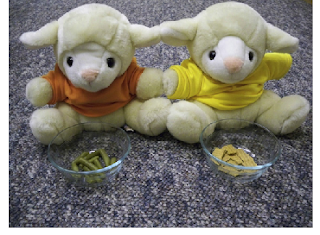I had a great time recording our "Guilty Displeasures" episode with Stacey. While we generally focus on things that we like, it was cathartic to vent a little bit about things that we didn't like, and freeing to do so about movies and shows that so many in our orbit seem to love.
But listening to the episode again, I was struck by a common refrain -- the insistence of friends who happen to love The Big Bang Theory, American Horror Story: Coven, Moulin Rouge, or Game of Thrones -- that because they love these movies and shows, that we should too.
And it's not as though I don't do this as well. If a friend tells me that they're just not that into my favorite actors, directors, plays, movies, or television shows, I find that I do my best to talk them into my way of thinking. And it gets worse if they can't give me a good reason why they don't like what I hold dear. Fair warning: if we're ever discussing one of my favorite things, and you say something like "I don't know; it just didn't do anything for me," I might be tempted to talk your ear off about all the wonderful things that you obviously didn't see in this thing that has captured my imagination and turned me into a raging fanboy.
So what's going on here? Why can't I just like what I like and allow you to like what you like, or not if that's what makes you happy? It turns out that the answer might lie in some of our most primitive impulses.
Back in 2013, a Yale researcher named Karen Wynn did some psychological experiments with infants and toddlers between the ages of nine and 14 months. They offered these babies a choice between two snacks: graham crackers and green beans. After the kids made their choice, they were presented with two stuffed lambs, one of whom was seen bobbing up and dowln over the bowl of graham crackers, and the other over the bowl of beans. The infants were then presented with the stuffed toys. Wynn discovered that the babies who preferred green beans
The implications of this research are clear. First, it's obvious that babies are not as sweet and cuddly as their parents would have you believe. Second, it's apparent that human beings are deeply tribal in their thinking -- from our earliest days, we are possessed of an "Us vs. Them" way of looking at the world. What's more, that part of what defines who belongs to "Us" and not "Them" goes beyond contentious issues like race and gender; this can also be determined by relatively benign things such as tastes and preferences. After all, whether or not a stuffed lamb prefers graham crackers over green beans isn't that much more substantial than whether or not a friend of mine likes or dislikes Scandal or South Park or Schindler's List.
Perhaps what's going on here is that we use common cultural experiences like movies or TV shows to help define our social circles, and that the risk of not challenging your friends and loved ones who can't stand your favorite show is a sneaking feeling that the friendship isn't nearly as strong as you once believed.
Maybe we should all lighten up a little bit. So, okay -- I promise that I won't talk your ear off about all the wonderful things that you obviously didn't see in my favorite summer movie if it just didn't ring your bells ... if you'll promise to let me hate the things that I hate.
That is, until next December rolls around, and a certain "holiday classic" (yes, those air quotes are sarcastic) once again captures the romantic yearnings of half my friends and causes me to doubt their sanity as well as their taste. I can't promise that I'll be able to hold back at that point.


No comments:
Post a Comment